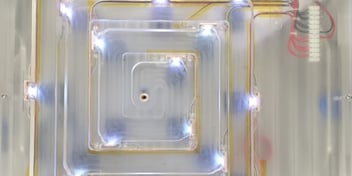New technology a boon for wastewater treatment worldwide
Researchers from the University of Bath have developed a new technology for removing micropollutants from wastewater, promising a more efficient method for wastewater treatment that’s also less likely to cause environmental and human health issues in future.
Lead by University of Bath Department of Chemical Engineering Professor Davide Mattia, researchers have produced a novel photocatalytic nanoporous anodic metal foam that utilises sunlight to remove pollutants.
The sponge-like substance uses sunlight to transform organic pollutants to non-harmful constituents – a much safer and more environmentally sensitive option in comparison to existing technologies, which risk the accumulation of large amounts of nano-sized photocatalyst particles in the environment following treatment.
Micropollutants, including chemicals, drugs and hormones, increase public health and environmental risks, but Mattia said the new technology offers wastewater treatment plants an environmentally-friendly option for micropollutant removal.
"I am very excited at having the opportunity to address the grand challenge of micropollutant removal,” he said.
"I believe our anodic metal foams represent an innovative and practical solution that water companies will be able to integrate in their existing infrastructure without radical changes, thereby lowering the barriers to their adoption."
University of Bath Water Innovation and Research Centre Director Professor Jan Hofman said Mattia’s development is a much-needed solution for the water industry worldwide.
"It is fantastic that Professor Mattia gets this opportunity for this exciting research for developing fundamentally new technology for organic micropollutant removal,” he said.
"Removal of these compounds from drinking water and wastewater is extremely important for public health and aquatic life. The water sector has great need for innovations in this field, which Professor Mattia's research can provide."

